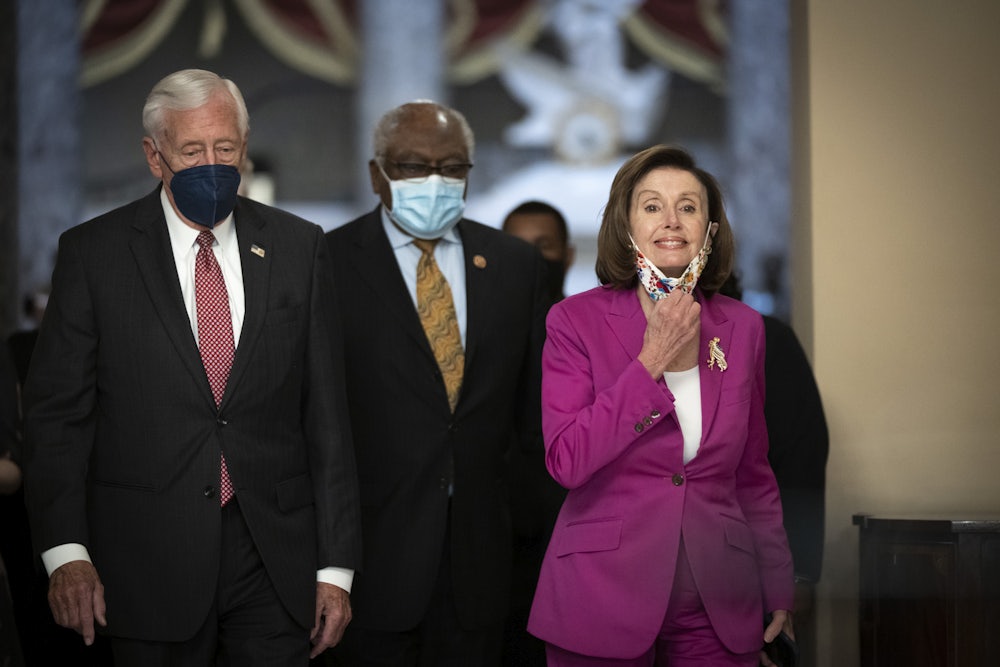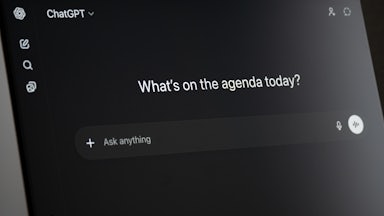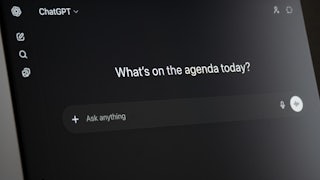A fretful Friday ended triumphantly for Democrats in the House of Representatives as they passed one of President Biden’s major priorities and set up a vote for another key bill. The votes came shortly before midnight, after lawmakers dithered for hours while Democrats tried to forge consensus allowing for the piecemeal passage of Biden’s legislative agenda.
By the end of the evening, the House had passed a bipartisan bill offering $550 billion in new infrastructure spending, with the losses of six Democratic votes offset by 13 Republicans voting in favor. The bill attempts to revamp the country’s crumbling physical infrastructure by rebuilding the nation’s roads, bridges, and public transportation systems, expanding broadband access, and funding climate resilience.
However, the House fell short of approving the second half of Biden’s agenda, a massive social spending bill known as the Build Back Better Act, which invests billions in childcare, health care, and measures to combat climate change. The House passed the rule for the bill along party lines, setting up a final vote on the legislation in the coming weeks. Together, the two measures amount to a roughly $3 trillion investment.
Movement on both bills occurred shortly after 11 o’clock in the evening, after a key group of moderate Democrats released a statement committed to supporting the Build Back Better Act, despite concerns about its cost, after consultations with progressives. But agreement to take this action was not reached easily. It was the product of a delicately negotiated rapprochement, proposed by the Congressional Black Caucus and negotiated with the Congressional Progressive Caucus and moderate Democrats, essentially amounting to a high-stakes trust fall between leery lawmakers.
“Well, the whole day was a clusterfuck, right?” Representative Mark Pocan said on Friday evening, a comment that perhaps undersold the chaos of the day. However, he said negotiations had occurred “in a very congenial way … I mean, rank-and-file members figured out how to get shit done.”
By the end of the evening, most congressional Democrats and Biden were crowing about the passage of the bipartisan bill and offering assured statements that the Build Back Better Act would also be approved in the coming weeks. “Generations from now, people will look back and know this is when America won the economic competition for the 21st Century,” Biden said in a statement.
Although infrastructure week may finally be over, the battle to pass the president’s agenda is far from complete, and the dysfunction of Friday only highlights the difficulties Democrats face going forward.
The morning began with optimistic pledges from Democratic leadership for back-to-back votes on the Build Back Better Act and the bipartisan infrastructure bill. But by eight o’clock in the morning, when Republicans attempted their first stalling tactic by bringing forward a motion to adjourn, hope for a day of snappy action quickly faded.
Democrats hold a very narrow majority in the House and can afford to lose only three votes in order for legislation to pass. As no Republican will vote for the social spending bill, Speaker Nancy Pelosi needs buy-in from 218 of her 221 members. But by the morning, around five Democrats, all moderates, appeared to be holding firm in their opposition to voting for the bill. (These were the moderates who later signed onto the statement.)
These members wished to see the bill scored by the Congressional Budget Office, the nonpartisan agency dedicated to determining the cost of legislation, before they vote for it. But the CBO will not have a score for the bill ready for some time. Progressives, meanwhile, had repeatedly refused to vote for the bipartisan bill without also voting first for the Build Back Better Act, concerned that moderates would balk once the physical infrastructure legislation was passed. This obduracy has resulted in multiple scrapped votes over the past few weeks, as progressives held firm, forcing Pelosi to back down in her repeated attempts to pass the bipartisan bill on its own.
Thanks to these disagreements, Friday had the dubious honor of containing the two longest House votes in modern history. The first, lasting just over seven hours, was held open while Democratic leadership attempted to cajole the few remaining moderates unwilling to vote for the social spending bill into offering their support.
After meeting with the Congressional Black Caucus, Pelosi announced that the House would vote on the bipartisan bill and the rule for the Build Back Better Act. The rule for the social spending bill would set up the eventual vote, allowing it to pass after the CBO had scored it sometime in the next few weeks. This met with immediate resistance from progressives, who were no more interested in passing the bipartisan bill without the Build Back Better Act than they had been a week ago. It was a calculation by Pelosi that frustrated progressives: Instead of putting the Build Back Better Act on the floor and daring six or so moderates to vote against it, leadership appeared to be trying to pressure the 20 or so progressives who had said they would only vote for both bills in tandem by putting the infrastructure bill on the floor.
“Welcome to my world—this is the Democratic Party,” Pelosi told reporters late Friday afternoon when she announced the plan to vote on the bipartisan bill but not the Build Back Better Act. “We are not a lockstep party.”
This decision set up the second-longest vote in modern history, another minor procedural motion brought by Republicans, which lasted more than four hours. The Congressional Progressive Caucus huddled for a meeting that lasted nearly as long as the vote. Members waited for those assurances from moderate members that they would support the Build Back Better Act. Staffers brought boxes of pizza, the leftovers of which were later offered to reporters hungry for information and for dinner. Ohio Representative Joyce Beatty, the chair of the Congressional Black Caucus, traveled to the meeting room and waited to be allowed in to sit in during deliberations. (Beatty, the senior member of one of the most powerful blocs in the House, later told reporters that she had been permitted into the meeting.)
Moderates had expressed frustration that many progressives are unwilling to separate the two bills, arguing that it is costing the president a legislative win in passing the bipartisan bill. Some further blame recent electoral losses, including the disastrous defeat of Democrat Terry McAuliffe in Virginia’s gubernatorial race on Tuesday, on this strategy, although it’s unclear how much passing the bill would have propelled a candidate in an election Democrats were historically likely to lose.
Progressives have argued that they are not holding Biden’s agenda back but instead ensuring that all aspects of it would be enacted: the social spending and the bolstering of physical infrastructure. The president visited the Capitol twice to speak with Democratic members, once at the end of September and once at the end of October, but both times did not explicitly call for the House to pass the bipartisan bill without the Build Back Better Act.
On Friday, however, he called on the House to pass both bills in public remarks. He also spoke to multiple members of Congress throughout the day, including Democratic leadership. He called in to the Progressive Caucus meeting and addressed the group on speakerphone. Representative Jared Huffman told reporters lining the drab hallway outside the meeting that the president had asked for their votes “subject to some assurances and commitments that he was working to get.”
“The president is speaking with House leadership, progressives, and moderates in an effort to come to a solution. And he has been urging a vote tonight,” a White House official said in a statement to The New Republic. Biden later released a statement at around nine o’clock in the evening, “urging all members to vote for both the rule for consideration of the Build Back Better Act and final passage of the Bipartisan Infrastructure bill tonight.”
“I am confident that during the week of November 15, the House will pass the Build Back Better Act,” Biden said, a projection not shared by all Democrats. A senior White House aide said on Friday evening that Biden, who canceled his planned trip to Rehoboth Beach amid the chaos, was “in the residence with his policy and legislative teams, making calls and staying in close touch with leadership and members,” joined by Vice President Kamala Harris.
Finally, shortly after 10 o’clock in the evening, a group of five moderates—Representatives Josh Gottheimer, Stephanie Murphy, Kurt Schrader, Kathleen Rice, and Jared Golden—released a statement saying that they “commit to voting for the Build Back Better Act, in its current form other than technical changes” by no later than the week of November 15, upon receiving a CBO score “consistent with the top lines and revenues and investments” provided by the White House.
The six Democrats who voted against the bill were among the most progressive in the House: Representatives Alexandria Ocasio-Cortez, Rashida Tlaib, Ilhan Omar, Ayanna Pressley, Jamaal Bowman, and Cori Bush, who held firm to their conviction on needing to vote for both bills in tandem. “A vote in favor of the bipartisan Infrastructure Investment and Jobs Act alone would have jeopardized our leverage to improve the livelihood of our health care workers, our children, our caregivers, our seniors, and the future of our environment,” Bush said. “That’s why I joined several of my close colleagues in standing firm behind our promise to our districts and the American people that we will not leave our communities behind.”
But the majority of the Democratic caucus erupted in applause when the bill passed, relieved to have achieved some accomplishment. (Pressley waited until the bill had reached 218 votes—enough to pass—before switching her vote to a “no.”)
Knowing the exact cost is not an unreasonable request; members hardly had time to peruse all 2,145 pages of the bill, which includes nearly $2 trillion in massive investments in childcare, health care, and combating climate change. But the bill also includes offsets, primarily consisting of tax increases on corporations and the wealthy, that the Treasury Department and the Joint Committee on Taxation agree would pay for the majority of it. Democratic leadership also argued that several provisions in the bill have also already been scored, meaning that it would be possible to cobble together an understanding of how much it would cost. Moreover, and rather ironically given its enthusiastic support from centrist Democrats and some Republicans, the bipartisan bill may ultimately add more to the deficit than the social spending bill.
The situation is complicated by the Senate, where the opposition of two Democratic senators to the initial $3.5 trillion cost and various provisions in the bill have delayed agreement. House Democrats have now settled on legislation that would cost around $1.85 trillion, but it will likely be modified in the Senate. The bill must pass through reconciliation, a complicated process that allows for legislation to be approved without any Republican votes.
Some moderate members of the House had said for months that they would be unwilling to vote on the Build Back Better Act unless they knew it would be able to pass the Senate. But House Democratic leadership hoping for the Senate to vote first were stymied by the snail’s pace of negotiations in the upper chamber. Although most of the 50 Democratic senators support the bill, Senators Joe Manchin and Kyrsten Sinema have been critical holdouts on certain issues. Manchin has not firmly committed to supporting a larger social spending deal. He has also indicated that he is not even paying attention to what the House is doing this week, saying Wednesday that he had “no idea” what was happening on the other side of the Capitol.
Manchin had also warned, earlier this week, that he was willing to tank the social spending bill. “I, for one, also won’t support a multitrillion-dollar bill without greater clarity about why Congress chooses to ignore the serious effects inflation and debt have on our economy and existing government programs,” Manchin said in remarks on Monday. He also called on progressives immediately to pass the bipartisan bill. “Holding this bill hostage won’t work to get my support for the reconciliation bill,” he said.
Manchin’s vote is critical. If even one Democrat opposes it, the entire bill falls like a house of cards—which is a big part of why the bill the House votes on, even post-CBO score, will be changed.
“We’re going to send it over there, and a few senators are going to write it and send it right back. And if you don’t like it now, you’re going to like it less when it gets here,” Republican Representative Tom Cole needled Democrats during debate over the rule for Build Back Better.
There are several rules about what can and cannot be included in a bill passed through reconciliation. A provision on immigration is likely to be thrown out due to a ruling by the Senate parliamentarian, an expert on Senate rules and procedure. Another provision on the state and local tax deduction may be changed, due to disagreements between the House and Senate about how best to address the issue.
Moreover, Manchin has now achieved his goal—having the bipartisan bill he helped negotiate passed in the House.
“I am pleased the House of Representatives passed this bipartisan legislation and look forward to President Biden signing it into law,” Manchin said in a statement after the vote. “I have always said that the best politics is good government, and I’m incredibly proud of my bipartisan colleagues for their tireless efforts to get this across the finish line and deliver on this major investment in the needs of America.”
Progressives’ fear that he will have no incentive now to support a reconciliation bill may bear out; a considerable risk for those who put their credibility on the line to vote for the infrastructure bill on Friday. But despite these risks, the majority of House Democrats decided as a bloc that it was time to move forward, despite some significant disarray in the lead-up to the vote on Friday evening.
“We can’t control what the other body does,” Representative Gerry Connelly told The New Republic on Friday morning. “There are targeted things that we care about that we want to put in that bill.”
Connelly further called on all Democrats to remain unified, despite any lingering doubts. “I think we saw Tuesday, failure to come together has consequences, political consequences,” he said. “And I would say that all my colleagues, none of us will be immune from that if we don’t pull together.”








